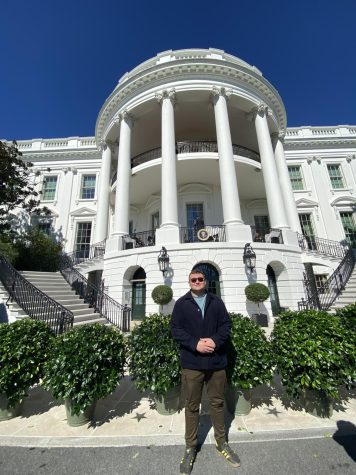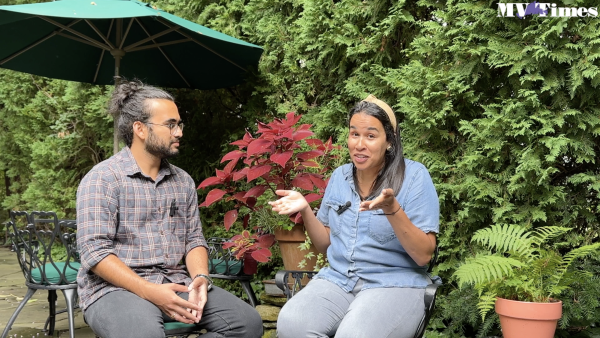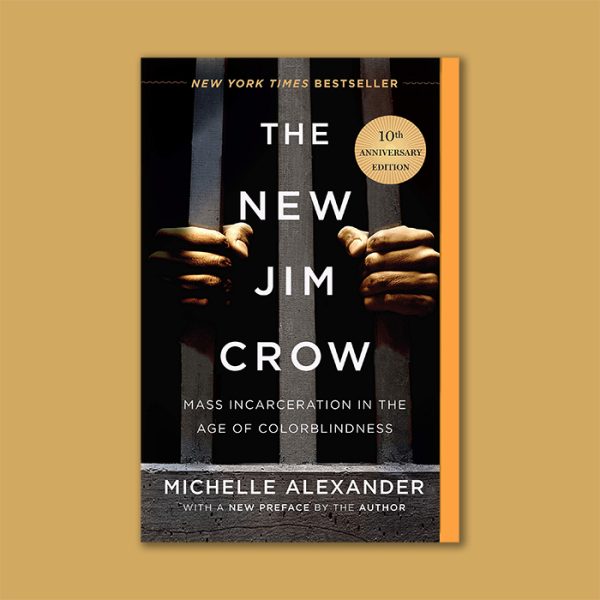Interview on New US/UK Relationship Poll

James Johnson, founding partner of JLP, and a political adviser and pollster, who has previously served as the Senior Opinion Research and Strategy Adviser to former British Prime Minister Theresa May. He also provides media commentary on the latest political and electoral developments, about their latest research, and what its findings reveal and what they mean.
November 2, 2022
Sebastian Grace, editor of Global Observer, spoke with James Johnson, founding partner of JLP, about their latest research, what its findings reveal and what they mean. Johnson is a political adviser and pollster, who has previously served as the Senior Opinion Research and Strategy Adviser to former British Prime Minister Theresa May. He also provides media commentary on the latest political and electoral developments.
A read out on the poll, some recent contexts and key takeaways is available in a previous Global Observer story: https://gobserver.net/5442/commentary/poll-captures-us-uk-relationship-in-new-contexts/. Have a look!
The following interview, conducted virtually on Oct. 27, has been edited for length and clarity.
So James, could you give me an overview of the new poll you have conducted and how it came about?
We conducted this transatlantic poll for the Atlantic Future Forum, which is a conference that happens annually, this time in New York harbor on the Queen Elizabeth airport aircraft carrier. We did a poll of a nationally representative sample of US adults and a nationally representative sample of UK adults, really to try and do something which people haven’t sort of just zoomed in on for quite some time, which is how the UK and US public compares on a range of questions, especially as we head into a difficult period. We called the report, “United in strife: British and American public opinion in an age of uncertainty.” So we tried to look at where they are united, where there was a bit more difference between the two countries, and how they view issues around the world.
Some of the conclusions were really interesting. There are some great areas of cooperation between the UK and the US. There was not one area, all the way from nuclear weapons to technology research, where people wanted less cooperation between the two countries. There were just variations of degrees of where they wanted more, for example: Brit’s are a bit more keen on immigration cooperation than Americans are. But broadly speaking, there is real overlap, with both countries naming each other as the country seen as having done the best on Ukraine. And both countries also identify each other’s military as being their main strength. That’s slightly surprising to me, I expected that UK to the US, but also, the US to the UK feels that as well. So that was also quite significant.
We do start to see some differences when it comes to views on Russia and China. And so Americans are much more likely to feel that their country is being too soft on Russia and too soft on China. Whereas Brits tend to feel that the balance is about right. And we also see differences on how we should react to China, if there’s a Chinese invasion of Taiwan, with the US being slightly more supportive of some of the real military measures, but there’s still a majority opposed to military action in that case, but they are just more likely to support it than the Brits, and then some worrying signs as well ahead of the future. I mean, you know, signs of Ukraine fatigue, we asked this question, asking people if they had to prioritize Ukraine, but see a higher cost of living, versus if they could get a lower cost of living, but it meant that Ukraine was de-prioritised, and actually, more people chose the latter in the US, and it was completely split down the middle 50/50 in the UK.
Perhaps my favorite part of the survey, the bit which I think is most interesting, we asked this question: what do you think is the biggest threat to Western democracy? And in the UK, it’s very clearly Putin and Russia. In the US, the top two are Putin and Russia, yes, but also the Republicans or the Democrats. And when you actually strip out the independents and the “would not vote” and you look at just Democrats and Republicans, they name each other as the biggest threat to Western democracy significantly ahead of Russia. So some sobering facts there on the level of polarization in the US, compared to the UK.
That’s the overview. It landed really well at the conference. It generated lots of interest. There were copies on everybody’s seats, it was referred to in talks and obviously got into Politico’s DC Playbook, as well as some other coverage in the UK.
For me, I think one of the most interesting results other than the ones you mentioned, was the discrepancy of 20% on NATO, in terms of favorability. And I was wondering what your thoughts were on that? I think perhaps the reason is the difference in coverage of NATO. It seems a lot more of a hot button issue over here in the US than in the UK.
Yeah, I think it’s partly that, the attention deficit on it in the US. I also think when you look at the data, it’s the Republicans that are driving a bit more of that. It’s not necessarily antipathy, but people going into the don’t know category or the neither confident nor unconfident category. So there’s a party element in the US in the way that there isn’t in the UK, and I don’t think that’s too surprising considering the messaging effort from previous President Donald Trump on that 2% defense target, which seems to have sort of continued amongst Republican views of NATO. They’re not saying they oppose it, but they are saying that they’re not sure how confident we are in it. But I mean, that US result is still significant, you still see support for NATO by, you know, almost a margin of 4 to1. So it is significant, it is a positive result for the organization, regardless.
You mentioned a little bit about the reception at the conference to the poll. But have you heard from any policymakers on this? I know people always say foreign policy doesn’t matter, particularly to the American public. But these are interesting and practically useful findings. I was wondering if you took any soundings from people on this?
Yeah, we’ve had, you know, we’ve had engagement from embassies, we’ve had engagement from the UK Government, who obviously also co-sponsor the conference itself. As with all of these things, you never quite know where it might end up. And you often don’t know what the end results of these things are. But hopefully, it’s been useful in informing people about some of the context. We’re certainly going to be doing it again next year. whether it’ll be transatlantic, or whether it will be a different approach, it will partly depend on where the conference is, it might have more of a European tilt. But we’ll certainly be doing more. And we also do the annual polling for the Munich Security Conference, where not only are we polling the US and the UK, but also the rest of the G7 and Ukraine as well. That will be coming out in February of next year. Hopefully, we’ll get a lot of policymaker interest, partly because of the Conference’s brand. But also, because there are some very interesting findings in there. That will also be an opportunity to develop this research a bit further.
That will be super interesting. Could you speak a little bit about the methodology in this study? I mean, there must be some specific kind of difficulties and circumstances around this kind of polling across borders.
Absolutely. The way that we tend to focus on this is very much, you know, we are looking at these as two different polls even though they’ve got the same questions. You need to treat them as two different polls, or you can end up not quite getting things right. So we’ve talked to 1000 people in each country, we did that online. And the key thing really is making sure that the quotas are right. We based that on census data in the US and on ONS data in the UK, basically on age, gender, region, and past vote, which is really important. This is important because a lot of online surveys in the US are currently producing quite high levels of recall for Biden 2020. For example, a recent YouGov poll that came out just this week, had a recall of Biden +13. Now, of course, you can weigh that and you can try and address it, but actually it is getting the right sample in the first place which is really important. So we worked hard to make sure that the sample was a realistic reflection of, politically, trying to get as close to where it is now.
You know, polling is never perfect. This is the best analogy I’ve heard, goodness knows who coined this, but it’s a bit like a balloon animal, you know, you’re trying to sort of change it in one place, and you think you’re fixed one side and then it bulges out the other end, and you’ve got another problem somewhere else. So there’s always difficulties with that. But we’re pretty confident of two robust samples here, because we’ve treated them as separate entities, despite the same questions. And that’s also what we do in that larger scale work as well.
What you do have to be careful of is making sure that you are asking the questions in the right cultural way. So what I mean by that is simple things like language differences, not a major issue admittedly with the US and UK samples. But one example on this survey was cost of living versus inflation. Americans don’t really use that cost of living phrase, whereas the UK doesn’t really use the inflation term in a political sense. So that was a difference that we baked into the survey. And when we poll in places like France or Japan, there’s some great academic data out there, particularly in France showing that French people answer the survey questions much more pessimistically, much more negatively. So you’ve also got to make sure to not to over state some of the comparisons because obviously, people are approaching these polls in different ways.
Right, yeah. When did you do it? I was wondering if the time of the poll had any influence on that, particularly with the rather extreme question on the proximity to World War Three (in the poll, 54% of the British public and 61% of Americans say that a major global conflict or third world war is likely in the next five years) given the high salience of events in Ukraine?
That wasn’t a cheery one, was it? It was conducted between Aug. 16 and 18 earlier this year, run in both countries at the same time. I think that actually worked out quite well. It was actually around the time that optimism was just sort of starting to break through in Ukraine I think, after the Kharkiv region retreat, or at least around that time, and the sort of nuclear weapons discussion was, you know, occasionally popping up in an article but not front of mind. And then in the UK, of course, it was this interregnum period between Boris Johnson and Liz Truss’ premierships. So, yeah, we’re pretty confident that we managed to select a time where things were realistic. Obviously, there are some caveats needed, for example that we often see a seasonal effect. So if you poll in the summer versus polling in the winter on questions like inflation, you’re going to see that be a bigger concern in the winter. And there’s political cycles and other things going on, especially given how fast moving the current pace of political debate is that will impact it. However, because these were quite sort of attitudinal broad based questions, we’re confident that they are still applicable today.
Yeah, it’s unlikely that an opinion on NATO would change between Johnson and Truss, isn’t it? Do you think Ukraine is the main driver of the current foreign policy attitudes of people? I know that it’d be difficult to get someone’s opinion on World War Three coming soon without that kind of being so much in the news, so do you think that’s the big driver of the opinions in this study on the current state of geopolitics?
Yes, absolutely. In the survey we have conducted for the Munich Security Conference, we’ve seen fear about chemical, biological, nuclear weapons rocket up in the last year, compared to where it was before, where concerns were much more focused around the environment and more focused around the COVID-19 pandemic. So yeah, there has been a big tilt back towards those sort of traditional power concerns. And, yes, the role of Russia and having that force on the eastern borders of Europe is very, very worrying to people. I think you see, in terms of how much support there is on the question of what should we do with Russia if it chose to invade a major NATO country in Eastern Europe, you see huge amounts of support in the UK and the US for direct, on the ground military action. Now we know they’re not just answering that question, you know, blindly because they’re not answering it that way in regards to China and Taiwan. So I think that threat has really crystallized in people’s minds. Look, I think there’s a general pessimism that we’ve seen in polling over the last few years, even before the Russian invasion of Ukraine that is no doubt getting picked up in that World War Three question. But I would not expect it to be this high were it not for the events on February 24 and since.
You touched on this, but obviously, Americans are more politically polarized than in the UK. The Republican versus Democrat answer was fascinating. Folks in the UK didn’t blame Conservatives or Labor or even the EU which we could add to that mix given the events of the last few years. Could you speak a bit more to that? Is that a common result when you poll Americans in different contexts?
Yeah, hugely. That polarization in the US is still really significant. Some issues it does transcend, for example, recently around the gun control bill that was passed, the compromise bill, there was support on both sides for that. And you do occasionally see support, particularly on Ukraine, actually, amongst the public. But in terms of the future of the West, the future of democracy in the US, in terms of views on most political issues, there is that very sharp dividing line, that very sharp polarizing line between Republicans and Democrats. And it’s almost become that if you have a view on something, it almost logically follows when we’ve done focus groups in the US and we see all the time, people will have a view based on their party affiliation, and you can quite easily predict where they might end up on trans issues, on climate change, on approach to dealing with the COVID-19 pandemic for example. Just by their affiliation in a conversation. If you do that same thing in the UK, and you sit down with a bunch of Conservative voters or you sit down with a bunch of Labor voters and you ask them about trans issues, about approach to COVID-19, about Black Lives Matter, whatever it might be, you will get a huge range of different views on those things amongst that one group, regardless of whether they’re Conservative or Labor voters. So, yes, that is a huge effect. And we see it in other countries as well. We see it in Canada to a degree, we see it in Australia to a degree, particularly on the question of climate change. But that is certainly something where, yeah, it comes through in almost all of the polling and, you know, we’re gonna see it sat behind the results in November as well, I’m sure.
That’s for sure. So JLP is branching out into the US. Is that right? How is that work going? How is the transition?
Yep. So we’ve got an office in DC. We are basically doing some political work, we’re doing some polling in some of the key states to try and, you know, show our methods. Our key approach in the US is not just doing single method polls. Our main approach in the US is actually saying, you know, single mode polling, especially when it’s phone polling, which has a lot of live caller polls in the US, have the largest polling error. We are saying, you know, you need a mix of approaches. So we do SMS, we do live calling, because they do have a role in the US where people are not, in some states not so online, or at least not very keen to take the time to do online panels. We do online, but we also do, and this is sort of our USP in the US, which not so many others are doing, we also do in-app polling. So if you’re sat there playing a game on your phone, and you get a notification saying you can get 2000 in-game points if you fill out this quick survey, that helps us reach people who are perhaps not traditionally answering polls. So we’ll be testing that method in November, as well as continuing our corporate and foreign policy work in the US, ahead of 2024.
Interesting. Well, good luck to you, and I really appreciate you taking the time. Thank you, James.
No problem, Seb, thanks a lot.











